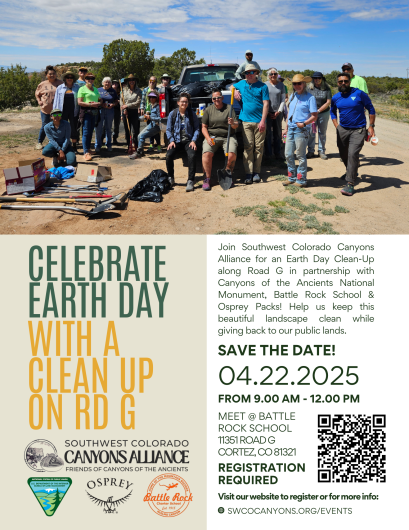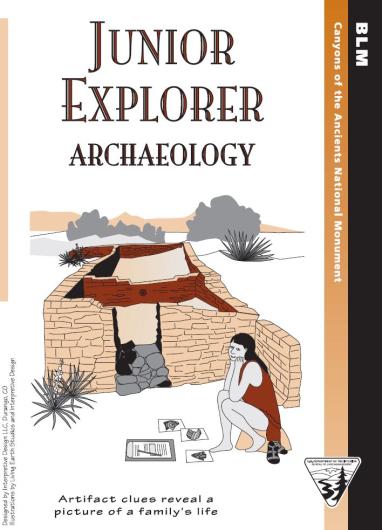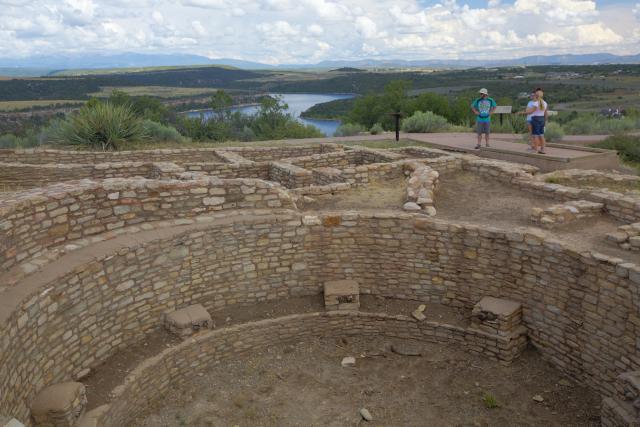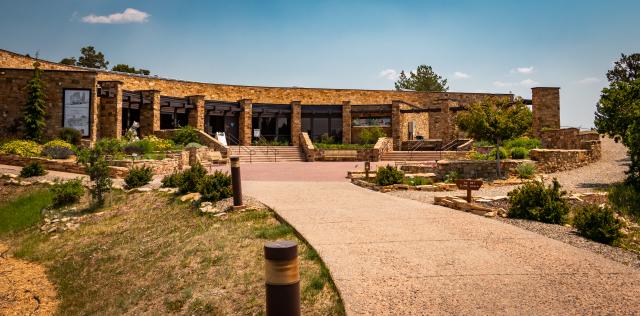
Canyons of the Ancients Visitor Center & Museum
Canyons of the Ancients Visitor Center and Museum is Southwest Colorado's premier archaeological museum, housing permanent and temporary exhibits focused on Ancestral Puebloan, Native American, and historic cultures in the Four Corners region. The BLM-operated Visitor Center provides information and orientation for visitors to Canyons of the Ancients National Monument. Facilities are wheelchair accessible.
Features include:
- Permanent exhibits on archaeology, local history and Native American cultures
- 12th-century archaeological site Dominguez Pueblo adjacent to the Visitor Center
- Half-mile nature trail leading to Escalante Pueblo overlooking McPhee Reservoir
- Picnic area
- Special exhibits and events
- Educational resources for teachers
- Internships for enrolled and recently graduated college students
- Research library of archaeology and anthropology resources
- Research collection of more than 3 million artifacts and records from archaeological projects in Southwest Colorado.
Celebrate Earth Day with a Clean Up!
Join Southwest Colorado Canyons Alliance for an Earth Day Clean-Up along Road G in partnership with Canyons of the Ancients National Monument and Battle Rock School. Help us keep this beautiful landscape clean while giving back to our public lands. Save the date for April 22, 2025. Register here.
Become a Canyons of the Ancients Junior Explorer!
By completing activities in the booklet and taking a pledge, you can become an official Canyons of the Ancients Junior Explorer!
Commercial Tour Group Operators
Please call (970) 882-5612 to schedule your visit one month in advance. Museum admission is $7 per person. Tours visiting the monument are required to obtain a special recreation permit. Information on how to apply for a special recreation permit is provided below.
Special Recreation Permits
Canyons of the Ancients National Monument and Tres Rios Field Office accept commercial Special Recreation Permit applications and modification requests for the following year every September 1 through 30. This includes existing permittees requesting permit modifications such as requesting additional use areas or proposing changes to the pre-existing purposes and/or activities authorized. Please review the CANM/TRFO Special Recreation Permit Policy for additional information.
About the Museum
The Canyons of the Ancients Visitor Center and Museum displays the culture and history of the Ancestral Puebloan people, and the methods that modern archaeologists use to reveal the past. The museum preserves artifacts and records from excavations in the Four Corners area, one of the richest archaeological regions in the United States, and is also the headquarters for Canyons of the Ancients National Monument. Our goal is to increase public awareness of archaeology and cultural resources in the Four Corners.
The museum is 7,000 feet (2,150 m) above sea level at the foot of the San Juan Mountains in Southwest Colorado, and about 17 miles by road from Mesa Verde National Park. The grounds overlook McPhee Reservoir and the Montezuma Valley.
Tours
Interpretive Program Schedule
Call the Visitor Center for current offerings (970) 882-5600.
Explore Inside
LEARN about Four Corners archaeology and prehistory through interactive computer-based permanent exhibits.
TOUCH real artifacts- bone drills, stone points, pottery, etc.- excavated from Ancestral Puebloan (Anasazi) sites
DISCOVER the age of a wood sample by matching it to a tree-ring chart like archaeologists use.
SEE how an early Pueblo household was furnished in a replica pithouse.
FIND a cross-section of the replica pithouse in an archaeologist's test trench.
RECALL the last century of history in the Dolores River Valley in our River of Sorrows hallway exhibit.
VISIT the current Special Exhibit in the Special Exhibits Gallery.
WATCH our movies The Cultural Heritage of the Great Sage Plain (19 min) and Visit With Respect (9 min) to see Four Corners history through the eyes of both archaeologists and Native Americans.
Explore Outside
ENJOY our picnic area with six tables at the beginning of the trail to Escalante Pueblo.
TRAVEL the Escalante Trail, a half-mile-long, paved, uphill, wheelchair-accessible trail with an excellent 360° view of area. Signs along the trail illuminate history and the local environment.
DISCOVER the Escalante Pueblo, a compact village of the mid-1100s. Its style reflects the Chaco culture that was centered in northwestern New Mexico.
LEARN about Dominguez Pueblo, right in front of the museum. This four-room structure probably was home to one or two families.
Special Exhibit
The BLM Canyons of the Ancients Museum and Visitor Center is proud to announce our new exhibit, “Sand, Stone, and Songs: Ancient Lessons from a Living Landscape” opening to visitors in 2022. The exhibit features the architecture of sites within the Monument:
"The rugged landscape now known as Canyons of the Ancients National Monument has many names, attesting to its importance in the daily lives and ancestral histories of many diverse cultures. The Towa language speakers of Jemez Pueblo in Northern New Mexico refer to the landscape as Ky'âawaamu. Their Keres-speaking neighbors to the south at Zia Pueblo, whose homes now sit near an important confluence of the Rio Grande River, refer to this ancestral landscape as Huniona coshcotwit. And the Hopi speakers, in the ceremonies and stories of their thriving pueblos in eastern Arizona, refer to the Monument's landscape as Tawtoykya, meaning "the place where the songs came from.” The Hopi word ltaakukuveni is another important linguistic testament to their modem and ancestral connection with this landscape as it is their word for "footprints” and is used to describe the extensive and widespread artifacts and pueblos intentionally left by their Hopi ancestors (the Hisatsinom) as a tool for their descendants to identify the breadth of their ancestral landscape and the depth of their cultural knowledge. That these "footprints" remain on the landscape is also a boon to archaeologists, to architects, and to the modem cultures that now live in this unique environment. Puebloan individuals, families, and communities developed and refined techniques that allowed them to thrive in this landscape for hundreds of generations, not least of which were their architectural methods used for designing and building sustainable homes perfectly suited to the wild temperature fluctuations, strong winds, and ever-variable precipitation regimes of the mountains, canyons and desert floors of the Southwest.
Recent technological developments, such as LiDAR, photogrammetry, and reflectance transformation imaging offer the precision and detail necessary for preserving and understanding these reservoirs of indigenous knowledge. For the past 15 years, the BLM and the Center of Preservation Research at the University of Colorado Denver have worked in partnership to apply these modern techniques to our preservation and understanding of these ancient cultural resources. Through this work, we hope to document one aspect of the multifaceted footprints left by skilled Puebloan men and women, allowing the lessons of construction, adaptability and sustainability contained in the builders' songs to be heard by future generations."
Educational Resources
On-Site Programming
Canyons of the Ancients National Monument partners with San Juan Mountains Association education staff to schedule and deliver stellar programming on the Monument and at the Museum. Southwest Colorado Canyons Alliance provides adult education opportunities, special cultural demonstrations, and assists with vital service projects on the landscape.
Click here for a list of our current educational program offerings.
If you are interested in scheduling a field trip or have questions about our educational program offerings, please reach out to: info@sjma.org.
To learn more about our education partners and how to get involved, please visit: https://sjma.org/ & https://swcocanyons.org/
Classroom Resources
We are excited to offer you a range of educational loan kits to support cultural, historical, and archeological learning in your classroom. We offer archeological kits that represent Ancestral Pueblo peoples of Southwest Colorado, Ute culture, civics, artifact analysis, and much more!
At this time, we are not able to send these educational loan kits to schools until further notice. If you are a local teacher and are able to pick up and drop off a loan kit from Canyons of the Ancients Visitor Center & Museum in Dolores, CO you are welcome to follow to the Educational Loan Kit link below to request a kit for your classroom. Thank you for your understanding.
To learn more about these kits, or request a free kit for your classroom, please visit: Educational Loan Kits
Other Educational Opportunities
Kids who visit our Visitor Center and Museum can participate in one of our Junior Explorer Programs or our Agents of Discovery Missions! Ask a Ranger to learn more!
Student internships are periodically available in Curation, Exhibits, and Visitor Services. Apply today with Ancestral Lands Conservation Corps Individual Placement to join our team.
Dolores Archaeological Program
In 1977, the Bureau of Reclamation (BOR) contracted with the University of Colorado to perform archaeological and historical fieldwork and analysis in the McPhee reservoir area.
During six field seasons (1978-1983), Dolores Archaeological Program (DAP) archaeologists surveyed and recorded 1,626 archaeological sites on 16,000+ acres in the project area. They fully excavated 125 sites, and collected more than 1.5 million artifacts--including historic glass bottles, a prehistoric bone tool kit, and thousands of ceramic vessels and fragments (sherds). DAP maps, photos and records provide a vast knowledge base that otherwise would have disappeared forever. Nearly 100 Dolores Archaeological Program Technical Reports are currently available for download in searchable PDF format.
As a part of the overall project, the Canyons of the Ancients Visitor Center and Museum was constructed to preserve both artifacts and records in perpetuity. The Canyons of the Ancients Visitor Center and Museum is an official federal repository for archaeological materials, which continue to arrive from permitted, legitimate excavations on public land in southwest Colorado.
Many Dolores Archaeological Program artifacts are on display at the Canyons of the Ancients Visitor Center and Museum. The rest represent an invaluable resource for archaeologists, historians, graduate students, and other scholars and researchers. Anyone with a legitimate research interest may access the collection by prior arrangement with the curation department. Supervisory Curator Bridget Ambler can be reached by phone at (970) 882-5622, or by email at bambler@blm.gov.
Collections
Even though the Dolores Archaeological Program material was excavated decades ago (the dam was completed in 1985), we are still learning from these artifacts today. New research technologies emerge and new questions arise, so these collections continue to provide new information and a deeper understanding of past lifeways.
Some people think that artifacts have no value beyond the aesthetic, but archaeology is how we discover the past when written records are unavailable. Most of the long story of the human race can only be reconstructed through archaeological methods. In our time of profound social and environmental change, archaeology is more important than ever. Studying how ancient people impacted their landscape can inform our own modern decisions regarding the public lands our children will inherit.




